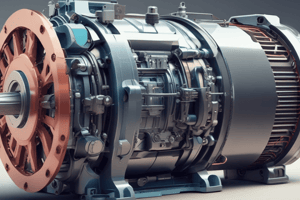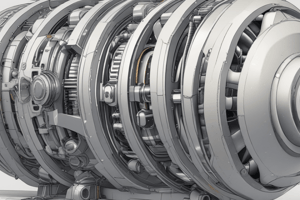Podcast
Questions and Answers
What is the primary function of the stator in an induction motor?
What is the primary function of the stator in an induction motor?
- To rotate the motor
- To carry magnetic flux (correct)
- To generate electricity
- To convert AC to DC
What is the purpose of laminating the stator core in an induction motor?
What is the purpose of laminating the stator core in an induction motor?
- To increase eddy currents
- To increase the power rating of the motor
- To reduce the magnetic flux
- To reduce losses and heating (correct)
What is the difference between an induction motor and a DC machine?
What is the difference between an induction motor and a DC machine?
- Number of phases
- Shape of the rotor
- Type of windings
- Presence of commutator (correct)
What is the purpose of the magnetic path in the stator of an induction motor?
What is the purpose of the magnetic path in the stator of an induction motor?
What is the typical material used for making the stator core in an induction motor?
What is the typical material used for making the stator core in an induction motor?
What is the minimum number of sets of windings required for a 3-phase induction motor?
What is the minimum number of sets of windings required for a 3-phase induction motor?
What is the reason for the air gap in an induction motor being uniform and small?
What is the reason for the air gap in an induction motor being uniform and small?
What is the primary application of induction motors in industries?
What is the primary application of induction motors in industries?
What is the typical range of the slot space factor?
What is the typical range of the slot space factor?
What is the recommended ratio of slot depth to slot width?
What is the recommended ratio of slot depth to slot width?
What is the typical thickness of the slot liner?
What is the typical thickness of the slot liner?
What is the formula to calculate the length of the mean turn?
What is the formula to calculate the length of the mean turn?
How is the flux density in the stator tooth typically calculated?
How is the flux density in the stator tooth typically calculated?
What is the typical range of flux density in the stator tooth?
What is the typical range of flux density in the stator tooth?
How is the depth of the stator core calculated?
How is the depth of the stator core calculated?
What is the formula to calculate the area of the stator core?
What is the formula to calculate the area of the stator core?
What is the value of the specific magnetic loading in Tesla?
What is the value of the specific magnetic loading in Tesla?
What is the value of the full load power factor for the induction motor?
What is the value of the full load power factor for the induction motor?
What is the volume of the stator in cubic meters?
What is the volume of the stator in cubic meters?
What is the number of stator turns per phase?
What is the number of stator turns per phase?
What is the total number of stator slots?
What is the total number of stator slots?
What is the number of conductors per slot?
What is the number of conductors per slot?
What is the revised number of turns per phase?
What is the revised number of turns per phase?
What is the specific electric loading in ac/m?
What is the specific electric loading in ac/m?
What is the typical peripheral speed for the normal design of induction motors?
What is the typical peripheral speed for the normal design of induction motors?
What is the purpose of the cooling fan located at the non-driving end of the motor?
What is the purpose of the cooling fan located at the non-driving end of the motor?
What is the relation between the gross length and pole pitch that is usually assumed to obtain the best power factor?
What is the relation between the gross length and pole pitch that is usually assumed to obtain the best power factor?
What is the type of slot that is rarely used in 3-phase induction motors due to higher air gap contraction factor and hence poor power factor?
What is the type of slot that is rarely used in 3-phase induction motors due to higher air gap contraction factor and hence poor power factor?
What is the purpose of the terminal box on top of the yoke or on the side of the motor?
What is the purpose of the terminal box on top of the yoke or on the side of the motor?
What is the usual range of the ratio between gross length and pole pitch to obtain minimum overall cost?
What is the usual range of the ratio between gross length and pole pitch to obtain minimum overall cost?
What is the expression for the phase voltage Vph in terms of Eph, f, and Tph?
What is the expression for the phase voltage Vph in terms of Eph, f, and Tph?
What is the primary advantage of tapered slots over open slots?
What is the primary advantage of tapered slots over open slots?
Which of the following is a disadvantage of selecting a higher number of stator slots?
Which of the following is a disadvantage of selecting a higher number of stator slots?
What is the formula for stator slot pitch at the air gap surface?
What is the formula for stator slot pitch at the air gap surface?
What is the winding factor assumed for full-pitch distributed winding?
What is the winding factor assumed for full-pitch distributed winding?
What is the formula for calculating turns per phase?
What is the formula for calculating turns per phase?
What is the usual value of current density for stator windings?
What is the usual value of current density for stator windings?
What is the typical percentage of slot area occupied by insulation?
What is the typical percentage of slot area occupied by insulation?
What is the condition for selecting the width to thickness ratio of rectangular conductors?
What is the condition for selecting the width to thickness ratio of rectangular conductors?
Flashcards are hidden until you start studying
Study Notes
Induction Motors
- Induction motors are widely used in industrial applications, from small workshops to large industries.
- They are employed in applications such as centrifugal pumps, conveyors, compressors, crushers, and drilling machines.
Constructional Details
- An induction motor consists of a stationary member called the stator and a rotating member called the rotor.
- The stator and rotor are each made up of:
- An electric circuit (insulated copper or aluminum winding) to carry current.
- A magnetic circuit (laminated silicon steel) to carry magnetic flux.
- The stator:
- Consists of an outer cylindrical frame, a magnetic path (laminated steel laminations), and insulated electrical windings.
- Windings are placed inside the slots of the laminated stator core.
- Cross-sectional area of the windings must be large enough for the power rating of the motor.
Output Equation
- The output equation gives the relation between the various physical and electrical parameters of the electrical machine.
- Output Q (in kW) = Input x Efficiency.
- Input to motor = 3Vph Iph cos x 10^-3 kW (for a 3-phase machine).
- Output equation can be derived and simplified to Q = Co D^2L/ns kW.
Design of Stator
- Stator core and stator slots are the two main components of the stator.
- Stator slots:
- Two types: open slots and semiclosed slots.
- Semiclosed slots are commonly used in 3-phase induction motors.
- Selection of number of stator slots:
- Affects the weight, cost, and operating characteristics of the motor.
- Higher number of slots reduces leakage reactance, tooth pulsation losses, and increases overload capacity, but increases cost, weight, and magnetizing current.
Turns per Phase
- EMF equation of an induction motor: Eph = 4.44fFTphkw.
- Turns per phase (Tph) can be obtained from the EMF equation.
- Tph = Eph / 4.44fFkw.
Conductor Cross-Section
- Sectional area of the stator conductor can be estimated from the stator current per phase and a suitably assumed value of current density for the stator windings.
- A suitable value of current density has to be assumed considering the advantages and disadvantages.
Length of the Mean Turn
- Calculated using an empirical formula: lmt = 2L + 2.3tp + 0.24.
Resistance of Stator Winding
- Calculated using the formula: rs = (0.021 x lmt x Tph) / as.
- Total copper losses in stator winding can be calculated using the calculated resistance.
Flux Density in Stator Tooth
- Calculated considering the dimensions of the stator slot pitch, width of the slot, and width of the stator tooth.
- Limited to 1.8 Tesla.
Depth of Stator Core
- Calculated assuming a suitable value for the flux density in the stator core.
- Generally, the flux density in the stator core varies between 1.2 to 1.4 Tesla.
Studying That Suits You
Use AI to generate personalized quizzes and flashcards to suit your learning preferences.





